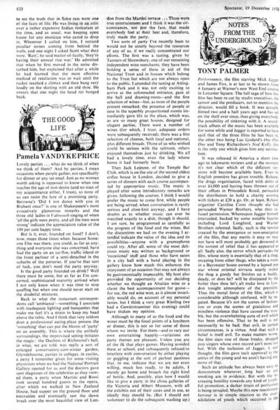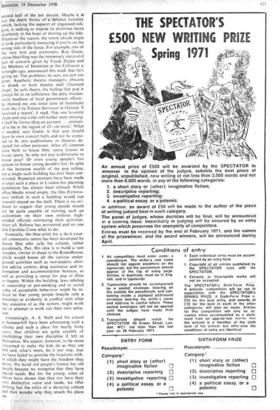TONY PALMER
Performance, the film starring Mick Jagger and James Fox, is at last to be shown from 4 January at Warner's new West End cinema
in Leicester Square. The full saga of how this film has been re-cut by studio executives, the censor and the producers, not to mention the director, would fill a book. It was actually filmed two and a half years ago and has sat
on the shelf ever since, thus giving everybody
the possibility of tinkering with it. A sound- track album of the music has been available for some while and Jagger is reported to hare
said that of the three films he has been in. the other two being Luc Godard's One Plus One and Tony Richardson's Ned Kelly. this is the only one which gives him any satisfac- tion.
It was released in America a short time ago to lukewarm reviews and at the moment
it's not clear which of the different ver- sions will become available here. Even its English premiere has given trouble. Release.
the drugs organisation, faced with debts of over £4,000 and having been thrown out of their offices in Princedale Road, persuaded the distributors to hold a charity evening with tickets at £20 a go. Or, at least, Release organiser Caroline Coon thought she had persuaded Warner Brothers, who then re- fused permission. Whereupon Jagger himself interceded, backed by some notable heavies including Lord Longford. and Warner Brothers relented. Sadly, such is the tension created by the emergence or non-emergence of the film, that any merits it may or may not have will most probably get drowned in the torrent of relief that it has appeared at all. Sadly also, the terror which pervades the film, whose story is essentially that of a thug, escaping from other thugs, who takes a room in a Bayswater house owned by a lapsed pop star whose oriental nirvana nearly makes the thug a goody but finishes up a baddy. deady, or does he? will be dissipated by the holier than thou let's all make love in Lon- don tonight atmosphere of the premiere. Thus the moral force of the film, which is considerable although confused, will be ne- gated. Because it's not the scenes of lesbian- ism or even the scenes of gratuitous and mindless violence that have caused the trou- ble, but the overwhelming aura of evil which has been offensive. That to be evil is not necessarily to be bad; that evil, in certain circumstances, is a virtue. And that such a belief is itself evil. To make matters worse, the film stars one of those freaky, drugged pop singers whose own record ain't none too hot. With the inclusion of Jagger, it was thought, the film gave tacit approval to the antics of the young and we aren't having any more of that.
Such an attitude has always been easy to demonstrate whenever long hair or pot smoking are in evidence. But with the in- creasing hostility towards any kind of youth- ful promotion, a darker strain of puritanism is being revealed. Maybe this new reactionary fervour is in simple reaction to the over- adulation of youth which occurred in the second half of the last decade. Maybe it is just the death throes of a defunct morality which, lacking the support of organised reli- gion, is seeking to impose its doctrines more absolutely in the hope of shoring up the tide. Whatever the reason, the storm clouds begin to look particularly menacing if you're on the wrong side of the fence. For example, one of the very best pop promoters, Roy Guest, whose final fling was the immensely successful pair of concerts given by Frank Zappa and the Mothers of Invention at the Coliseum a fortnight-ago, announced this week that he's giving up. The problems, he says, are just too great. Apathetic theatre managers, obscene or drunk or both theatre staff ('licensed thugs', be calls them), the feeling that pop is always let in on sufferance, the petty bureau- cratic madness of local government offices: he showed me one letter (one of hundreds) from the City Estates Surveyor in Oxford. '1 received a report', it read, that one lavatory chain and one toilet roll holder were missing. I shall be forwarding an account ... estimat- ed to be in the region of £5—or more.' What is needed, says Guest, is that pop should have its own concert halls and not be expec- ted to fit into auditoriums or theatres de- signed for other purposes. After all, cinemas were built to house film: opera houses to house opera. So why not pop auditoriums to house pop? Or even young people's fun palaces to house young people's fun. In spite of the immense wealth of the pop milieu, not a single such building has ever been con- structed. Repeated attempts have been made to erect such a place in London but planning permission has always been refused. While office blocks stood empty, the film Perform- ance (which in such a building would run forever) stayed on the shelf. There is no evi- dence to suggest that young people would not be quite capable of running such an auditorium on their own without high- minded officials overseeing their activities. After all, Release has prospered and no one tells Caroline Coon what to do.
Ironically, the blue-print for a do-it-your- self community centre has been developed by Simon Dee who calls his scheme, rather grandiosely, Pax. His idea is to build a vast complex, similar in shape to the Roundhouse, which would house all the various under- ground activities such as newspapers, abor- tion advice centres, drug assistance and in- formation and accommodation bureaus, as well as providing a venue for pop or films or theatre. Within the building, laws relating to censorship or pot-smoking and to social codes of acceptable behaviour might be re- laxed so that young people (maybe only a minority) so evidently in conflict with what they conceive of as the system, might work out or attempt to work out their own salva- tion.
Interestingly, A. S. Neill and his school at Summerhill have been advocating such a scheme and such a place for nearly forty sears: that children are quite capable of establishing their own discipline if left to themselves. We appear. however, to be more concerned to make the kids do as they are told and, what's more, do it our way, that we have failed to provide the locations with- in which they might have the freedom they desire. We build old people's homes for old People because we recognise that they have special needs. But for the young, some of whom have shown that they too have their Own distinctive voice and needs, we offer nothing but the relics of a decaying culture and then wonder why they smash the place up,







































 Previous page
Previous page